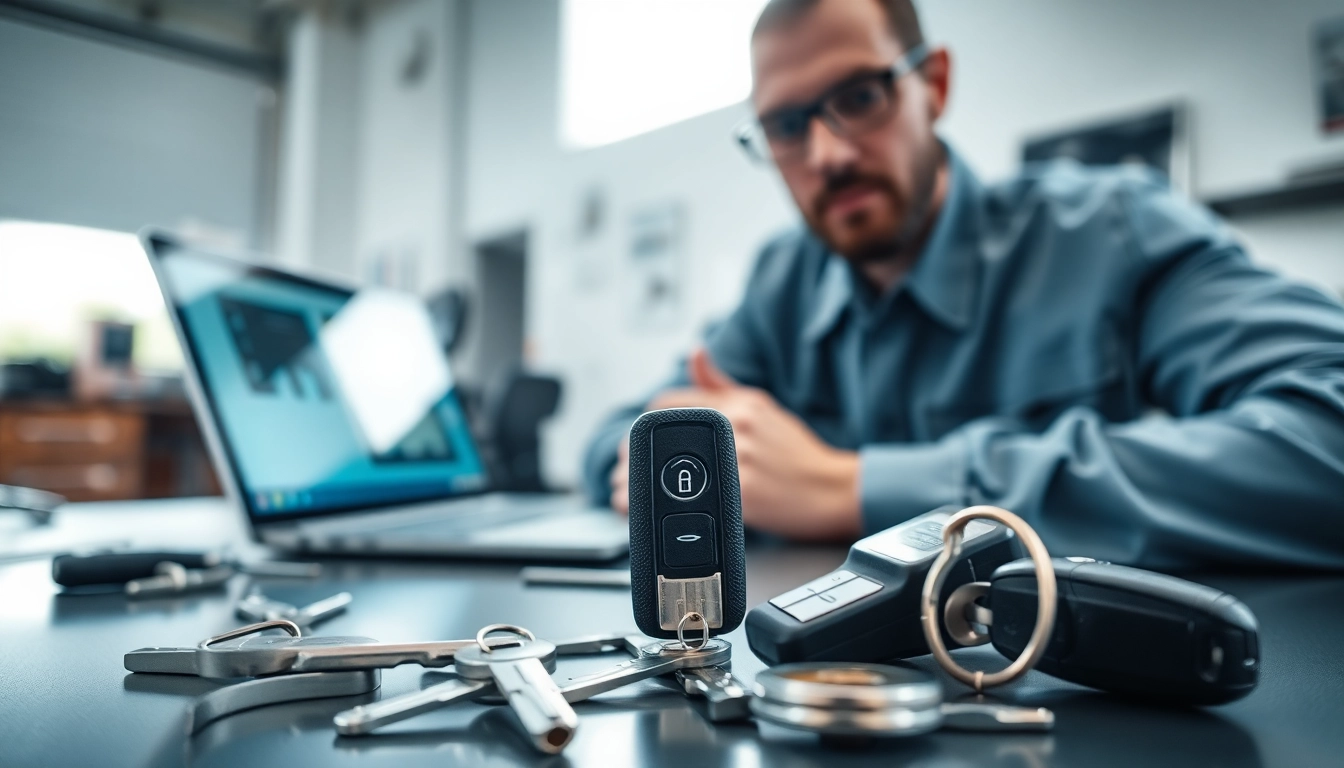Understanding Replacement Car Keys
What are Replacement Car Keys?
Replacement car keys are copies or new versions of the original keys used to unlock and start vehicles. As cars have evolved, so have their keys, transitioning from simple mechanical keys to advanced electronic fobs and smart keys. The technology behind car keys increasingly includes features such as remote entry and immobilizer systems, which require specialized equipment for duplication.
Types of Replacement Car Keys Available
When it comes to replacement car keys, different types cater to the various needs of consumers and the specifications of their vehicles. The primary types include:
- Mechanical keys: The most traditional form, requiring a simple cut to match the vehicle’s lock.
- Transponder keys: Equipped with a chip that communicates with the vehicle’s ignition system to prevent car theft. They require programming specific to the vehicle.
- Remote keys: Incorporate buttons for keyless entry and alarm systems, requiring unique programming.
- Smart keys: Often used in modern vehicles, allowing for push-button start and proximity access. They typically need to be programmed by a certified technician.
- Keyless entry remotes: Designed for remote locking and unlocking, requiring synchronization with the vehicle system.
Why You Might Need Replacement Car Keys
There are numerous reasons one might find the need for replacement car keys. Here are some common scenarios:
- Lost keys: One of the most frequent reasons for seeking replacements, particularly for individuals prone to misplacing items.
- Stolen keys: If keys are stolen, replacing them is imperative for vehicle security.
- Worn-out keys: Over time, keys can become damaged or worn, making them less effective.
- Additional keys: Owners may want to get spare keys for family members or emergencies.
- Upgrades: Switching to newer key technology, like smart keys, for enhanced functionality or security.
How to Obtain Replacement Car Keys
Options for Acquiring Replacement Car Keys
There are several avenues to acquire Replacement Car Keys, depending on your specific situation:
- Dealerships: Often the most straightforward option for getting replacement keys, especially for newer vehicles. However, this can be the most expensive route.
- Locksmiths: Many locksmiths offer key duplication services at a potentially lower cost than dealerships, especially for mechanical or standard transponder keys.
- Online services: Specialized websites may allow consumers to order replacement keys by providing the vehicle identification number (VIN) and other necessary details.
- DIY methods: With certain tools, owners can produce some replacement keys themselves, especially if they have a working key to copy.
Cost Factors for Replacement Car Keys
The cost of replacement car keys can vary widely based on several factors:
- Key type: Mechanical keys are typically less expensive than smart keys or transponder keys, which require specialized technology.
- Programming: Many advanced keys need to be programmed specific to the vehicle, increasing overall costs.
- Location: Prices can differ based on geographical area, particularly between urban and rural locations.
- Service fees: Fees for locksmiths and dealerships, including travel and service charges, can also play a role in total costs.
Steps to Replace Your Car Key
If you’ve found yourself needing a replacement car key, follow these steps:
- Identify the type of key: Understand what type of key your vehicle uses – this will determine your next steps.
- Gather required documents: Have necessary identification and vehicle documents ready. This can include your driver’s license and vehicle title or registration.
- Choose a service: Decide whether to go to a dealership, locksmith, or opt for an online service based on convenience and cost.
- Provide necessary information: If using an online service, provide detailed information about your vehicle, including VIN and current key patterns.
- Confirm programming requirements: Ensure that the replacement key can be properly programmed to your vehicle’s system if needed.
- Test the new key: After receiving your replacement, make sure to test it thoroughly to ensure it functions correctly and meets security standards.
DIY vs. Professional Services for Replacement Car Keys
When to Choose DIY for Replacement Car Keys
Do-it-yourself replacement can be a practical choice in some scenarios:
- Simple mechanical keys: If you only need a spare for a mechanical key, local hardware stores can cut duplicates at low costs.
- Availability of tools: If you have access to cutting and programming machines, some types of keys can be made at home.
- Cost efficiency: DIY methods may save money, particularly for older vehicles or basic key types.
Benefits of Professional Assistance for Replacement Car Keys
While DIY options exist, there are substantial benefits to engaging professionals:
- Accuracy: Professionals have the right tools and expertise to ensure keys are cut and programmed accurately.
- Security: By opting for professional help, you reduce the chances of key cloning, especially with transponder keys.
- Warranty: Many professionals offer a guarantee on their work, ensuring quality and reliability.
- Convenience: Professionals save you the time and effort associated with potential trial and error in DIY methods.
Common Misconceptions About Replacement Car Keys
Several misconceptions can cloud consumer judgment about replacing car keys:
- Only dealerships can provide replacements: While dealerships are a reliable source, many qualified locksmiths can perform this service at a fraction of the price.
- All keys are expensive to replace: The cost varies drastically depending on the type of key and technology. Some keys are relatively inexpensive to replace.
- Old keys can’t be replaced: Many older key types can still be duplicated, and advancements in locksmith technology have made it easier to handle rarity issues.
Tips for Maintaining Your Replacement Car Keys
Best Practices to Extend Key Lifespan
Maintaining your car keys can significantly extend their lifespan and functionality:
- Avoid dropping: Handle keys carefully; drops can damage the key’s electronic components or physical structure.
- Keep them clean: Regularly wipe your keys with a soft cloth to prevent dirt accumulation that might impair functionality.
- Store securely: Keeping keys in a designated spot reduces the likelihood of losing them or misplacing.
- Avoid water exposure: Avoid letting smart keys or remote fobs get wet to prevent electrical malfunctions.
Signs Your Replacement Car Keys May Need Attention
Being vigilant about the condition of your keys can prevent future issues:
- Difficulty starting your vehicle: If the key struggles to turn in the ignition, it may need attention or replacement.
- Wear and tear: Excessive wear on mechanical keys can indicate it’s time to get a new one cut.
- Intermittent response: If your key fob only works sporadically, the battery may be dying, or the unit may need repair.
Security Tips for Your Replacement Car Keys
Protecting your vehicle begins with safeguarding your keys:
- Consider tracking devices: For added security, consider attaching a tracking device to help prevent loss or theft.
- Program keys carefully: Ensure any new keys are programmed correctly to avoid unauthorized access.
- Use keyless entry features wisely: Utilize features like remote locking but be cautious as keyless entry can be susceptible to hacking.
The Future of Replacement Car Keys
Trends in Key Technology
The landscape of replacement car keys is continually evolving. Trends to watch include:
- Increased integration with mobile technology: More vehicles are allowing replacement key capabilities via smartphones for added convenience.
- Enhanced security measures: As technology advances, so do security measures, leading to more sophisticated anti-theft protections.
- 3D printing: Future advancements may allow for quicker manufacturing processes, reducing waiting times for replacements.
The Role of Smart Keys in Replacement Car Keys
Smart keys are anticipated to play a pivotal role in vehicle access moving forward:
- Convenience: Smart keys will continue to facilitate easy access and start without needing to physically insert a key.
- Innovation: With ongoing developments, expect enhanced features such as biometric verification for added security.
What to Expect in Key Replacement Services
The future of key replacement services promises several advancements:
- Faster services: Expect quicker turnaround times thanks to technological advancements and increased competition.
- Online consultations: Virtual consultations will allow consumers to assess their key replacement options before visiting a service location.
- Improved pricing transparency: As competition increases, pricing structures will likely become more transparent with clearer breakdowns of costs.



